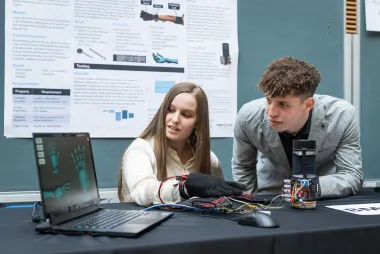"If we look closely, nature provides the most elegant and optimal solutions to many or even all engineering problems."

Justin Wyss
- Degree:
- Master of Applied Science
- Grad year: 2020
- Program:
- Campus: Vancouver
Justin Wyss is a graduate student in the School of Biomedical Engineering at UBC. Originally from Zürich, Switzerland, he conducts research in the Molecular Mechatronics Laboratory supervised by Dr. John Madden. His master’s research focused on flexible sensors and smart materials with their applications in healthcare. He developed a soft, flexible and stretchable pressure sensor array designed to warn of pressure ulcer (aka pressure injury, bedsore or decubitus ulcer) formation, one of the most prevalent and costly preventable secondary complications for individuals living with spinal cord injury (SCI). He is an alumnus of the Engineers in Scrubs (EiS) and e@UBC’s Lean Launchpad Program (LLP) and former President of the Biomedical Engineering Graduate Association (BMEGA).
Why did you choose to go into your field of study at UBC?
I have always had a strong interest in science and technology, which ultimately led to my undergraduate studies in Electrical Engineering. During this time, I had the opportunity to work as an Undergraduate Research Assistant, where my interest in medical and healthcare related research sparked. I decided to apply for graduate school to further my education, as I wanted to dive deeper into academia and explore research at a higher level.
I chose Biomedical Engineering for my graduate studies, as it aligned perfectly with my interest and desire to solve problems in the medical and healthcare realm.
What has made your time at UBC memorable?
As an international student, my time at UBC and in Canada has been an amazing adventure filled with many great memories that I will always cherish and remember. From meeting people on campus such as my peers, professors and researchers, I have formed life-long friendships. I have also loved learning about new cultures, getting involved within the community such as through the Electrical and Computer Engineering Student Society (ECESS) and the Biomedical Engineering Graduate Association (BMEGA). UBC and Vancouver have become my second home.
What has been your most valuable non-academic experience studying at UBC?
My most valuable non-academic experiences at UBC include my engagement with various UBC communities and friends across our beautiful campus, planning and hosting BMEGA events and programs (Holiday Social Dinner, Canucks Hockey Night aka “Let’s do that Hockey!,” Industry/Academic Nights and the Mentorship Program “BMEGA Connections”), winning the Faculty of Applied Science Award for “Best Innovation” at Hatching Health, joining Flutter Wear and participating at UBC Rec events and leagues (Storm the Wall, Intramural Futsal, Soccer, Volleyball - Champion, Gladiator - Winner).
In addition, the brunch outings with my Engineers in Scrubs (EiS) project team and the beach days with friends at the Locarno, Jericho and Kitsilano beaches during the summer will also remain fond memories of mine.
Tell us about your experience in your program. What have you learned that is most valuable?
During my master’s degree, I gained valuable experience in research, medical innovation and entrepreneurship. From the Engineers in Scrubs (EiS) Program, I was exposed to clinical environments, where I was able to shadow healthcare professionals and observe current state-of-the art procedures and technologies first-hand. This experience helped me to understand the needs and applications of technology in healthcare. From e@UBC’s Lean Launchpad Program (LLP), I discovered my interest in entrepreneurship. I entered LLP with my research project, SomaSense, completing the 5-week program with the most potential to succeed based on the mentors and peers in my cohort.
How are you applying the skills you learned through your studies at UBC?
By learning and understanding more about healthcare problems through research and entrepreneurship. I will continue to advance my technology during my PhD studies. I hope that one day my technology can become part of a solution or even the solution to preventing pressure ulcer formation.
What advice would you give a student entering your degree program?
Be creative, resilient and open minded.
How do you feel your degree has benefitted you compared to a different field of study?
Engineering has provided me with the mindset and tools to tackle and solve challenging problems around the world, especially in healthcare and medicine. I believe that with my engineering degrees, I have obtained the freedom and versatility to choose my career path after university, which may not have been possible if I had pursued another degree.
Where do you find your inspiration?
Inspiration comes to me in many forms, and at times in the most unexpected ways. I can find it in people, music, movies, quotes and many more. However, if I would have to narrow it down to two main sources, it would have to be my family and nature itself. I am lucky to have such amazing parents and brothers that continuously support me. They are my true role models that I look up to and learn from every day. The inspiration I find from nature is through simple observation. If we look closely, nature provides the most elegant and optimal solutions to many or even all engineering problems. After all, Mother Nature is the greatest engineer.
What are your immediate and/or long-term plans for the future?
This coming September, a new chapter will begin for me at UBC. I will be starting my PhD program in Biomedical Engineering. Eventually, I would like to focus my attention more towards my entrepreneurial ambitions.
What are your future plans to make a difference in our world?
With my current and future research, I am trying to lessen the burden experienced by individuals in need and ultimately improve their quality of life, may that be through academia or industry.



